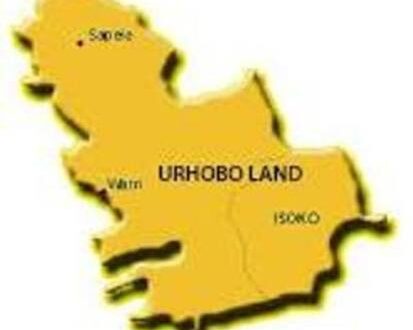By Young Erhiurhoro
The above topic is not only common or limited to the Urhobo people, but to other ethnic or tribal groups in Nigeria and across the African continent. To start with, ancestral spirits which is called ‘Erivwin’ in Urhobo parlance is a major item or area of worship in the African traditional religion (ATR). No doubt, before the introduction of Christianity to many parts of Africa by the British missionaries, the Africans as black people were those that strongly believed in the worship and service of different mystical and spiritual beings like ancestral spirits, deities, water spirits, spiritual husbands and wives etc.
Importantly, the service and worship of ancestral spirits is naturally common amongst the Urhobo people. It’s a traditional belief that is centred on the eternity of the soul of man as eternal being. The Urhobos believe that, the soul of man doesn’t die, but continue to live amongst his people at all times through the philosophical processes of reincarnation or second birth. According to this traditional belief, man is actually made up of two parts: the body and the soul. The body which is the physical part can die at any time while the soul which is the spiritual part do not die. Once the body dies, the soul can’t be seen again with our physical eyes because at that time, the dead person in question has now fully turned to be a spiritual being and will continue to live in the spiritual world. He can only be seen by physical beings that are spiritually gifted with spiritual knowledge. These ancestral spirits in most cases are represented by totems and images as point of physical contact during worship and service. These totems and images are placed or kept in ancestral halls built for such purpose in most communities in Urhobo land.
Again, the service to these ancestral spirits is done in the form of veneration by offering a special Urhobo traditional gin called “Ogogoro” and two Urhobo delicacies called “Oghwo” and “Ukodo” to them from time to time or during special occasions in the family before presentation of prayers on needs or desires of family members or celebrants. In actual truth, ancestral spirits in the African perspective are forebears or progenitors in families and communities. They were celebrated heroes in each families. In order to maintain and protect their legacies from extinction, they must be remembered by their children in such mystic services as the veneration of their living souls. Of important note, the veneration service to these ancestral spirits in such divine or special occasions in Urhobo land is naturally vested on the most elderly man, which must be in this case a paternal son of every extended family.
However, we have discussed the first part of the topic which is on ancestral spirits. The second part of the topic is centred on the sanity and dignity of the marriage institution in Urhobo land. The Urhobo people as their culture demands practice both monogamy and polygamy types of marriage. In this case, the Urhobo people have great honour and respect for a married woman. In Urhobo culture, once marriage is traditionally and legally contracted between a man and a woman, such a woman is fully bound and tied to the man until death do them apart. There are strict marital rites to be performed by the families of both the man and woman to protect the dignity and sanity of the marriage especially from the side of the woman to avoid breakage or divorce. This dignity and sanity we are talking about is basically meant for the woman as she is perpetually tied to the man. This is to help her avoid extra marital affairs with other men. But such laws are not enforceable on Urhobo men as they are free, without questioning to marry other wives or have concubines outside the marriage. Urhobo men are free to do so.
Before this age of modernity and civilization in Urhobo land, which is today being fuelled by the uncontrolled acculturation acquired by Urhobo people from traveling to distant places; any woman from any part of the world that married to Urhobo man was fully monitored and guarded by the said ancestral spirits, even in the absence of her husband from having extra marital affairs with other men outside her marriage. Once an Urhobo wife indulge in such incandescent marital acts, she would be punished by the husband’s ancestral spirits by inflicting on her uncommon or a strange disease or sickness. The woman in this case can’t be cured of such a disease or sickness, not until she publicly confesses to the husband and his family members as her case is being presented to the ancestral spirits by the family elders for veneration and forgiveness by the ancestral spirits. The family elders at the end, would pray for forgiveness on her and her children. It’s here the woman would be set free.
In those days, it was a taboo for a man to have a handshake with an Urhobo wife. It was also against Urhobo marital vows for an Urhobo wife to put on trousers of any kind. It was equally unheard of for an Urhobo wife to move out of her home or compound with one sized piece of wrapper. It was expedient and compulsory in those days for every Urhobo wife to dress with two sized pieces of wrapper once she was leaving her home to another place, whether within or outside the community. The message here was that, Urhobo wife must dressed decently to present herself to other men that, she was a married woman. It was also a taboo for another man to hold the hands of Urhobo wife, let alone touching her face, breasts or buttocks. These were grievous marital attrocities in those days in Urhobo land. Any Urhobo wife that commits such acts must be inflicted with one kind of sickness or the other or inflict the children with such strange sicknesses to force the mother to confess immediately. In case, she refused to confess, the child might die at the end. Some women that have storny hearts or adamant to repent, have lost many of their kids as a result of indulging in such extra marital affairs.
Therefore, the highest and most dreaded of all the extra marital affairs in Urhobo land in those days was for Urhobo wife to have sexual relationship with another man, yet she claimed to be a wife of a particular man in the family or community. This marital offence was so dreaded that the offender which in this case was the woman would always be made to sacrifice a male goat to appease the ancestral spirits before she could seek freedom in the marital home. No matter how powerful such a woman was, the man’s ancestral spirits must pursue her to bend. Either she confesses or loses her children born to the man. It was really a terrible situation in those days. As a result of this, many marriages were protected and secured by constantly maintaining the dignity and sanity of marriage through the actions of the Urhobo ancestral spirits. Having known that, many marital shortfalls were being instigated by wild women who just covered up with the name of marriage.
Unfortunately, today in Urhobo land, all these strict marital laws and vows to enforce dignity and sanity in the marriage institution have gone into abyss. The Urhobo marriage institution is now weak because it was shaken to the roots by some unforeseen and foreign cultural changes. The respect and honour accorded Urhobo wives today is not as of old. There are reasons for such sudden changes. Some of the reasons are acculturation, modernization and civilization. The Urhobo culture generally and the marriage institution in particular had gone through many stages of cultural and sociological transformations. The Urhobo culture is today mixed with other cultural practices and values from other neighbouring ethnic groups or even from foreign lands alien to the Urhobo ways of life or contracting the Urhobo traditional marriage.
Again, modernization and civilization have contributed to the weakness of the Urhobo marriage institution. These two social tools have exposed many Urhobo women through the power of education to know more about themselves and their fundamental rights, even as women in the society. Today, Urhobo women are now agitating for their rightful places or positions in government, corporate organizations, communities and socio-cultural groups within or outside Urhobo land. During the colonial and pre-independence periods in Nigeria, it was very rare to hear of women being in politics or holding positions in government of the day. But today, the story has changed in Urhobo land through the power of modernization and civilization brought about by education. Today, Urhobo women are celebrities in different fields and professions. They are very active in politics and also holding different positions in government. These same social tools have wiped away the specks in their eyes by smashing to pieces those Urhobo hard restrictions placed on Urhobo married women by the Urhobo ancestral spirits.
Finally, the Urhobo way of practising today’s form of Christianity is a hard nut to crack in the Urhobo marriage institution. It’s telling worsely on the institution of marriage. First, Christianity has condemned the serving and worshipping of ancestral spirits by Christians as form of paganism or idol worship. In this case, even if Urhobo wife commits extra marital affairs with other men outside, she would be comfortable without venerating or appeasing the ancestral spirits as the practice in those days. Secondly, many of the churches in Urhobo land are supporting and encouraging Urhobo wives to dress indecently. In a situation where married women would be permitted to wear trousers to church services, they are only being exposed to the gimmicks of adultery which even the Holy Writ totally condemns. Thirdly, Christianity has made the Urhobo world a free world. Today, women now hug other men in church or social functions, shake hands with other men, dance together with other men in social events and other ceremonies. Such restrictions that were placed against women to avoid such practices in time past are no longer respected as the Church classified them as forms of idolatry. All what they believe now is, God is a merciful being unlike the ancestral spirits that seldomly pardon offenders.
Should the Urhobo people restore and revive the practice, service and worship of the Urhobo ancestral spirits as of old to protect and promote the dignity and sanity of the Urhobo marriage institution again?
Young Erhiurhoro;Kjc is a reporter and a member of the Urhobo Historical Society
 PH Mundial – Port Harcourt Online Newspaper News Across The Region
PH Mundial – Port Harcourt Online Newspaper News Across The Region




